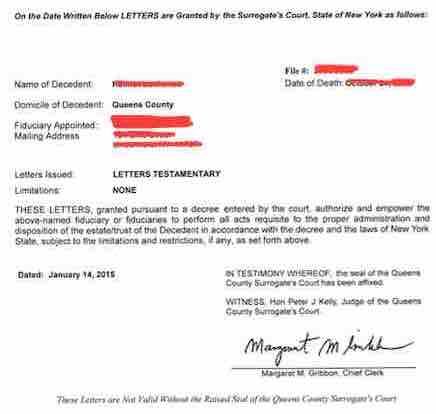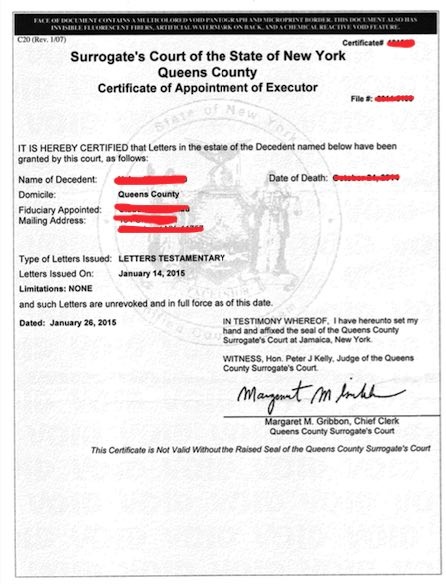How to Get Letters Testamentary
In order to get letters testamentary, you need to submit a petition for probate together with its supporting documents to the Surrogate’s Court. A letters testamentary attorney can help you obtain them.
Here is a redacted image of Letters Testamentary obtained by our law firm:

Where to File for Letters Testamentary
You will file this petition in the Surrogate’s Court where the decedent last resided. If the decedent died in a nursing home or while incarcerated, you will file it in the county where the decedent was a resident before entering the nursing home.
Documents You Need
Here are the documents you will need:
Petition for Probate
The probate petition will require information about the decedent, the executor, beneficiaries of the will, close of kin of the decedent, size of the estate. An estimate of the gross estate of the decedent passing by will, separately showing the values of personal and real property, gross rents for a period of 18 months, and information about any cause of action for personal injury or death
Original Will
You will need to submit the original will to the court. Do not unstaple the original will even if you are scanning it.
Original Death Certificate
You will need to file a copy of the death certificate and an original death certificate with the court.
Affidavit of Comparison
Executed by a disinterested person stating that they have reviewed a copy of the will and that it is the same as the original will being submitted. This requirement may be waived by the court
Waiver of Process, Consent to Probate
This document is executed by the heirs of the decedent – those who stand to inherit if there was no will. Heirs still need to execute this document, even if they are excluded/omitted from the will and not listed as a beneficiary. If you cannot get waivers from all the heirs, you will need to get a citation from the court.
Citation
A Citation is issued by the court to those heirs who do not execute waivers. You will need to provide a draft citation to the court.
Notice of Probate
You will need to send a Notice of Probate to all beneficiaries listed in the will
Filing Fee
The filing fee ranges from $215 to $1250 depending on the size of the estate. The exact fee can be computed by cross-referencing Surrogate’s Court Procedure Act § 2402
Proposed Decree
Proposed order to be signed by the Surrogate, granting the nominated executor Letters Testamentary
Affidavit of Heirship
An affidavit of heirship needs to be executed by a disinterested person when the decedent was survived by no heir, one heir, or where the surviving heirs are related to the decedent through a person who is also deceased
Make sure that you submit a complete set of documents to the court. Failure to submit complete documents will result to delays in the issuance of Letters Testamentary. With delay, you will not be able to immediately perform your duties as executor and you cannot marshall and collect the assets of the decedent. You will not be able to take hold of bank accounts or sell real estate belonging to decedent.
Although a petition for probate can be done pro se (by yourself), delay may ensue in the issuance of letters testamentary, especially when the documents you submit are not complete. Although we have outlined the main documents required, the court may require additional documents depending on the circumstances of each case.
How Long Does it Take to Get Letters Testamentary
It typically takes a few months to get letters testamentary. If the probate is contested, i.e. if someone is challenging the will, then getting letters testamentary can take years, or they can be potentially denied altogether. Although getting the letters is only one of the steps of the probate process, it is the most important step.
Certificates of Appointment of Executor
Once you are granted Letters Testamentary, you will need to get a few Certificates of Appointment of Executor. You will need more than one since each bank and government agency would require an original. Also, some institutions require a more official-looking document. This is why the court can also issue a Certificate of Appointment of Executor, which is printed on a watermarked blue and red paper and looks similar to a death certificate, birth certificate or marriage certificate.
Here is a redacted image of a Certificate of Appointment of Executor obtained by our law firm:
If the person who died did not leave a will, the document will be similar and with similar powers, but it will be called “Letters of Administration,” and the Certificate will be called “Certificate of the Appointment of Administrator.”
Do Letters Testamentary Expire
Whether or not your letters testamentary will expire depends on the text. If the document does not specify that it expires, then it does not expire. What does expire is the Certificate of Appointment of Executor. You would need to renew those every six months.
Preliminary Letters Testamentary
How to get Preliminary Letters Testamentary
When you think there’s going to be delay in the issuance of Letters Testamentary, you can request for Preliminary Letters Testamentary (also called Temporary Letters). The issuance of Preliminary Letters Testamentary allows you to do the following things, except to distribute assets to the beneficiaries:
- Collect all assets, including bank and brokerage accounts
- Pay taxes and debts of the estate
- Sell real property that has not been given to a particular beneficiary in the will
When can you get Preliminary Letters Testamentary
Examples of situations where you can get Preliminary Letters Testamentary:
- When the estate will suffer imminent damage if letters testamentary are not issued, e., there is a foreclosure sale or debts have to be immediately paid (otherwise, penalties will be imposed)
- An excluded heir contests the probate of the will, which could delay administration of the estate for months to years
- You need to file a lawsuit on behalf of the estate before the statute of limitations to file the claim expires
The person who usually files an application for Preliminary Letters Testamentary is the nominated executor of the will.
Other types of “Letters”
Letters Testamentary is distinguished from Letters of Administration (used when a person dies without a will) and Voluntary Letters of Administration (used when a person dies with a small estate).
If you do need legal representation for your Letters Testamentary, we at the Law Offices of Albert Goodwin are here for you. We have offices in New York City, Brooklyn, NY and Queens, NY. You can call us at 212-233-1233 or send us an email at [email protected].













